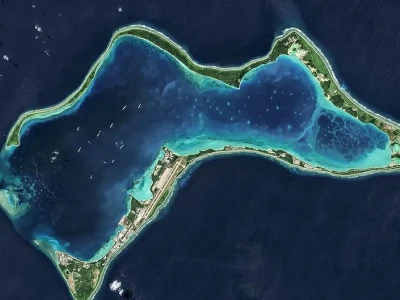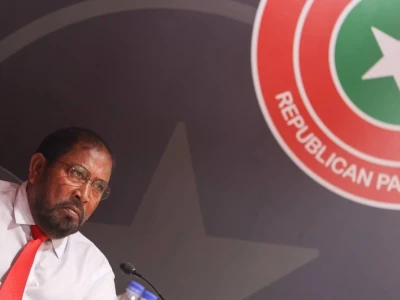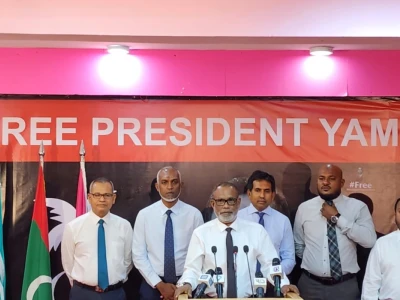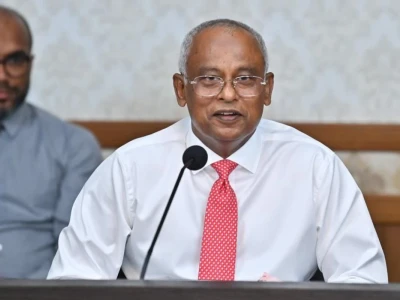
Government accused of changing Chagos stance under Indian influence
Dr Munawwar said it was impossible for the government to end the issue of sea region demarcation in favour of Maldives after the decision that was made.
By
Mohamed Muzayyin Nazim
Former Attorney General Dr Mohamed Munawwar on Monday accused the government of changing its stand to recognise Chagos as part of Mauritius to benefit India.
Munawwar described the decision as "taken at a time most unsuitable", and that it was detrimental to the people.
Munawwar's concerns about the "sudden" change in government policy and the country's economic zone in the Chagos case was shared at a press conference on Monday.
He initially said that the meeting was being held to clarify the situation as there was a "compulsion" to, and since the government has refrained from making any statements.
Before opening to questions from journalists, Munawwar raised questions about whether another party had any influence in the government's policy change. Replying to a question by Atoll Times on whether it was India's influence, he said the government's decision has certainly benefited India. He also gave reasons to why India would want it.
"Mauritius has a very close relationship with India. The vast majority of Mauritius' population is of Indian origin. People of the Indian race also serve as prime minister of Mauritius. That's why India will weigh on Mauritius to get it, because of their close relationship," Munawwar said.
He said there was another reason why India wanted Mauritius to get Chagos, which was to increase their dominance in the region.
Pointing out that Indian troops were stationed in Hanimaadhoo, North Thilafalhu and Addu in the south of the Maldives, he said, "Then they will want the south of Addu".
"To the south, it's Chagos. As soon as Mauritius claims it, they [India] will have control of the Indian Ocean," Munawwar said of India, which is already rumoured to have built a secret military base in Mauritius.
"Without their permission, the [Indian] Ocean cannot be crossed from one end to the other. You can see the world's hunt for influence... Isn't that how even Indians would work in a world like this? Will all Chinese shipments transported by sea to Africa, Middle East and other parts of Asia be able to cross over without their permission?"
Munawwar believes that since India had the advantage, it had "pushed" Maldives to change its policy.
"Those running the government know better [why they changed their stand]. But the way things are going and the way we are being squeezed, we can be sure that this is how it must have happened", he said, reiterating when asked a second time if the government's decision was changed due to Indian interference.
He said that until the government proves otherwise, he believes that policy has changed because of Indian influence.
"We believe it happened that way. Otherwise, it is not a suitable time to change the country's stand", said Munawwar, who is considered to be one of the most experienced lawyers in the field of maritime law in the country.
‘Go home if you can't’
Munawwar, who was the first president of the ruling MDP, also criticised President Ibrahim Mohamed Solih and Attorney General Ibrahim Riffath.
According to the government, the decision to vote in favour of Mauritius at the United Nations was taken to oppose decolonisation. The government also said that Maldives' recognition that Chagos is a part of Mauritius will not affect the issue of Maldives-Mauritius maritime demarcation, and that these are two separate issues.
Munawwar said it did not make sense.
"In the tribunal hearing, Ibrahim Riffat says that we have decided that we will accept the sovereignty of Mauritius on Chagos. If it's two issues, why did he have to talk about it there? Earlier, it was being said at the tribunal that Mauritius was raising the issue through the back door, and so the matter cannot be looked into", Munawwar said.
"If these are two issues, then it shouldn't have been mentioned there."
He said that while nowhere has it been decided that Chagos belongs to Mauritius, the government should not say that Chagos is under Mauritius sovereignty by justifying the change to be 'against decolonisation policy'. He also pointed out that the UN resolution on the issue does not have to be implemented.
"It is still a debate, an assumption that Mauritius has sovereignty over it. Ibrahim Mohamed Solih, as President of the Maldives wrote a letter to the Prime Minister of Mauritius stating that he believed Chagos belongs to Mauritius. Otherwise, he does not know how the world works, or doesnt know what he is about. I’m weighing more on the latter", Munawwar said.
"Is this the time to state that? What harm will it do if we don't accept it? Then these people are calling it a decolonization policy. Wasn't the policy there when they debated in the tribunal that it was a case Mauritius was charging through the back door?".
Munawwar said it was impossible for the government to end the issue of sea region demarcation in favour of Maldives after the decision that was made. He also expressed concern that it would cause irreparable damage to the country's fisheries.
"It is being said indirectly that there should be an economic zone for them, so it should be divided. Isn't that what it means? Is it too much to comprehend?," he asked.
"(If they don't understand that much) then they’re not qualified. If that's the case, these people have to resign from their jobs for the benefit of the state. Whether it's the president or the ministers involved."
He also expressed concern that the government was not providing as much information as it was supposed to provide to the public about what was happening, in a case that would matter to every Maldivian.
"When such a case is going on, he [President Solih] has not said anything. ‘Good’ if it's good, ‘bad’ if it's bad... If they can’t do this much, then they should go home. If they don't decide to on their own, the people should come out and make them leave," Munawwar said.




